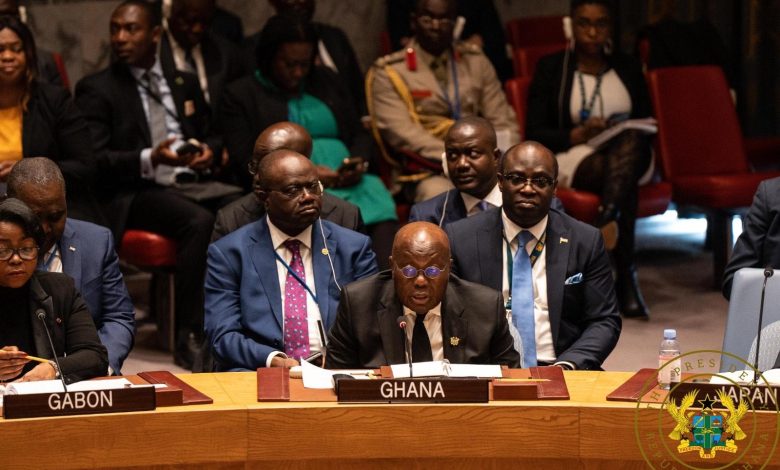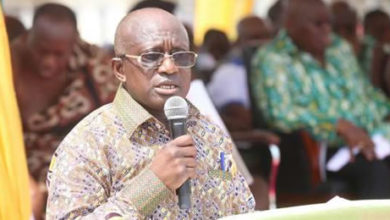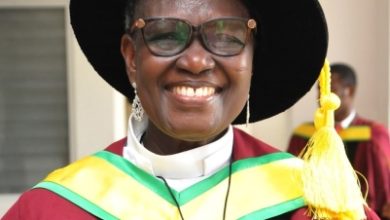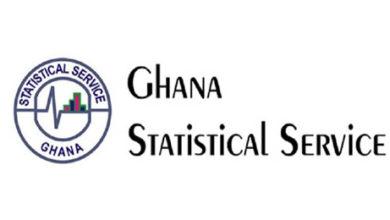Tackling violent extremism requires collective response – President Akufo-Addo at UN Security Council

President Nana Addo Dankwa Akufo-Addo has told the United Nations (UN) Security Council that there is the urgent need for a collective response to deal with the rising incidence of violent extremism and terrorism.
He said no single country, regardless of its might, was immune to the scourge of terrorism and violent extremism, nor could one country alone respond effectively to such threats.
President Akufo-Addo made the call when he addressed the UN Security Council Chamber at the UN Headquarters in New York yesterday.
He referred to the most recent report of the UN Secretary-General on the threat posed by the Islamic State of Iraq and the Levant (ISIL), also known by its Islamic acronym, Da’esh, to the international community, which was released in February this year, as well as the 2022 Global Terrorism Index and the 2022 report of the African Centre for the Study and Research on Terrorism.
He said those raised issues about an increase in the incidence of terrorism and violent extremism across Africa, with the attendant evolution in their modes of operation.
Indeed, he said, data on casualties on the continent were particularly sobering.
“It is for these reasons that Ghana reaffirms its condemnation of all acts of extremism and terrorism and urges the civilised world to do same. Our common humanity and existence depends on it,” he said.
Africa
President Akufo-Addo also expressed worry about the steady transformation of Africa into an arena for violent extremism and terrorism.
He stressed the need for partnerships across all levels, from the local to the regional and the global, stressing that the effectiveness of the UN now more than ever rested on cooperation that was both deeper and more robust with regional organisations.
He noted that in a rapidly changing world, enhanced co-operation between the UN and continental and regional organisations was needed to combat those emerging threats to international peace and security.
The partnership, outlined in Chapter Eight of the UN Charter, he added, had always been an important factor in preserving international peace and security and reinforcing our shared aspirations for global peace and security’.
Limitations
The President suggested that Africa had decided to fill the void by addressing the limitations that UN peacekeeping efforts and national capacities had in dealing with the menace of transnational terrorist threats.
He told the global body that in order to combat insurgencies in their respective regions, African regional organisations, such as the Southern African Development Community (SADC) and the Economic Community of West African States (ECOWAS), had developed their unique operations, which included both military and diplomatic initiatives.
The Accra Initiative, he explained, which grouped together Ghana, Cote d’Ivoire, Togo, Benin, Mali, Burkina Faso and, hopefully soon, Nigeria, was one such self-help regional security and intelligence mechanism designed to assist in the fight against terrorism.
Desire
He said the desire of those named countries was to contribute their quota to the fight against terrorism and violent extremism but there were some constraints militating against those efforts.
“Capacity limitations and a lack of financial resources have become significant obstacles in the fight against terrorists. Previous experiences with peacekeeping in Africa have shown us the difficulties in delivering ambitious but under-resourced mandates. Defeating terrorist organisations and armed groups should be the council’s primary focus when addressing the security challenges currently confronting Africa,” he said.
President Akufo-Addo said to bolster cooperation and collaboration, the UN and continental and regional organisations should leverage existing strengths to enhance the development of a preventative approach based on regional early warning mechanisms.
He added that efforts in conflict prevention and mediation had demonstrated how working together increased the powers of persuasion to press parties to make peace and defuse tension in localities.
“It is important that partnerships with regional organisations are based on mutual respect and must not attempt to impose preferred approaches on unique regional circumstances,” he said.
He said where that was forced through, it could only be detrimental to the work of regional organisations and the global effort to defeat terrorism, adding: “The activities of the UN, the African Union and other regional organisations should complement one another.”
President Akufo-Addo emphasised collective security demands that found the will to act collaboratively and decisively, in line with the respective mandates to defeat terrorism and violent extremism in Africa.
He added that it was important to reinforce the capacity of regional organisations for early warning and conflict prevention.
That, the President said, required an enhanced cooperation in the areas of intelligence, logistics, capabilities, training and deployment, as well as innovative financing arrangements.





